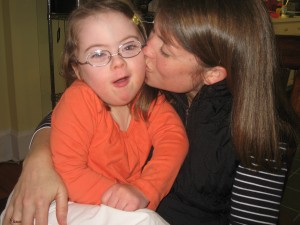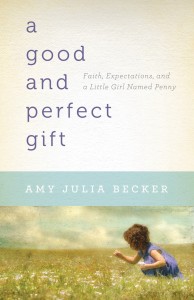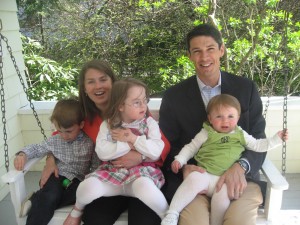Christopher Closeup podcast – Guest: Amy Julia Becker
 After her daughter, Penny, was unexpectedly born with Down syndrome, Amy Julia Becker experienced an emotional and spiritual crisis. As someone who was deeply devoted to her Christian faith and who even attended Princeton Theological Seminary, she naively thought things like this weren’t supposed to happen to her. But as Amy Julia grew to love and bond with her daughter, she got an education in love, God’s grace, and strength-in-weakness that no university class could have given her.
After her daughter, Penny, was unexpectedly born with Down syndrome, Amy Julia Becker experienced an emotional and spiritual crisis. As someone who was deeply devoted to her Christian faith and who even attended Princeton Theological Seminary, she naively thought things like this weren’t supposed to happen to her. But as Amy Julia grew to love and bond with her daughter, she got an education in love, God’s grace, and strength-in-weakness that no university class could have given her.
A few weeks ago, I reviewed Amy Julia’s book, “A Good and Perfect Gift: Faith, Expectations, and a Little Girl Named Penny” which we are pleased to honor with a Christopher Award. I also interviewed Amy Julia for our Christopher Closeup podcast and radio show. Below are some excerpts:
TR: In today’s world, what does a diagnosis of Down syndrome mean for a child’s health and prospects for life? Is it different for everyone or are there common denominators?
Amy Julia Becker: The common denominators would be that life expectancy has increased dramatically. In the course of my lifetime, the life expectancy of a child with Down syndrome has gone from 25 to 60. Babies born now are expected to live an average of 60 years, and there are some who are living into their 80s. That’s been largely due to advances having to do with heart surgery. About 50% of babies with Down syndrome are born with a heart defect, and about half of those heart defects will require open heart surgery which used to be incredibly risky and now is relatively routine – though it’s still harrowing for the parents.
The other common denominators involve low muscle tone, which just means that motor skills are going to come at a slower pace – and some coordination issues might be involved. Cognitive delays continue to be a factor, although there’s a really big spectrum as far as what that looks like on a practical level from kid to kid.
 TR: One of the biggest strengths of the book for me is your honesty about the moments when you admit feeling grief and disappointment that Penny had Down syndrome. Here’s a moment when every parent should feel unbridled joy and yet these contradictory emotions come in. Was it a struggle for you to be honest with yourself about how you felt, then ultimately to share that honesty with the world?
TR: One of the biggest strengths of the book for me is your honesty about the moments when you admit feeling grief and disappointment that Penny had Down syndrome. Here’s a moment when every parent should feel unbridled joy and yet these contradictory emotions come in. Was it a struggle for you to be honest with yourself about how you felt, then ultimately to share that honesty with the world?
Amy Julia Becker: I think the struggle was more in that first part – in the internal conflict I felt which came on two levels. One, there was truly a dissonance between seeing this beautiful baby who I instinctively loved, and who I had loved as I’d gotten to know her in the womb. In my brain, there was this fear that I would cease to love her – that Down syndrome would take over my child and I would no longer be the parent I wanted to be. I also had to confront my own fears about having a child with mental retardation and a disability. But when I finally wrestled through those emotions, I felt it was really important to tell other people about that. I wanted to give other women who were experiencing that same dissonance with their children permission to feel grief, anger and sorrow in the midst of the joy and love they were feeling. I wanted to offer some encouragement that it wouldn’t always feel that way.
TR: In the book, you refer to the fact that you’re a lifelong perfectionist…Looking at it from a religious angle – because you do deal with the Christian aspect of looking at Penny’s Down syndrome – in order to accept a Savior into our lives, we have to admit that we’re broken and imperfect in some way. In retrospect, would you consider your perfectionism a stumbling block to a deeper relationship with God all those years?
Amy Julia Becker: Yes! And it’s ironic because there’s a sense that what God wants for us through Christ is our perfection. But it’s such a different perfection than the perfection that the world offers us. It’s such a different perfection than my sense of essentially wanting to be able to do everything by myself. I had this perfection in mind that was about autonomous individuality as opposed to becoming a part of the Body of Christ which would mean that I would not only need God and therefore be unfulfilled and imperfect on my own – but also that I’d need other people. I’d need other believers to help me grow into the person that God wanted me to be, which would continue to be a person who had needs and wants and limitations. Having a daughter with a disability is what God used to help me see how wrong I was in the way I was striving for perfection.
 TR: There are a lot of touching moments in the book, one of which is when your husband, Peter, comes to see Penny as an answer to his prayer that his heart would become more open. How has embracing what you first saw as a cross become a blessing for you and Peter individually and as a couple?
TR: There are a lot of touching moments in the book, one of which is when your husband, Peter, comes to see Penny as an answer to his prayer that his heart would become more open. How has embracing what you first saw as a cross become a blessing for you and Peter individually and as a couple?
Amy Julia Becker: There are so many ways. One of the things that comes to mind is that I at first thought having a child with disabilities was going to narrow my experience of the world. I thought all I was ever going to think about was disability and Down syndrome. Instead, what Penny has done for us – and what God has done through her – is to help us see the value of every human life…and recognizing the image of God is imprinted in all of us. So what is it I have to receive from other people – and what is it I have to give? I really think I’ve had a transformation in my understanding of human relationships. Going back to that comment in the book about Peter’s heart becoming more open, it really has been opened not only to people with disabilities, but to the whole swath of humanity in all of our brokenness and all of our beauty.
TR: We’re going through these debates in the country and the world about what constitutes living a valuable life. Do you see a lot of the insights you’re applying to your specific situation also applying to the larger situation in the country and the world?
Amy Julia Becker: I do. I think there are a lot of parallels to how we understand human life, particularly at the beginning of life and the end of life and suffering in the midst of life. When we use a comment that someone’s in a vegetative state, I think any time you’re comparing a person to a product or a vegetable, you’re in trouble. I think it’s important to think about what I would call a ministry of presence. That’s not our experience with Penny. She happens to be a child who is talking and walking and, in many ways, like other six-year-olds. But you can take disabilities to the most profound end of the spectrum or think about people who are at the end stages of life and sometimes wonder – what is the value of this life? I think there are answers to be had there, but they’re only for those who have eyes to see, who are willing to receive the gift that God has through the weak, the vulnerable and the needy among us. It really goes back to what Jesus said about who we are to value and how we are to see the people who often go unseen. So I think it has implications for anyone we are tempted to dehumanize: people in prison, people who are homeless, the people who tend to get forgotten – again, beginning of life and end of life being examples of that.
To hear my complete interview with Amy Julia Becker, click:
Christopher Closeup podcast – Guest: Amy Julia Becker











